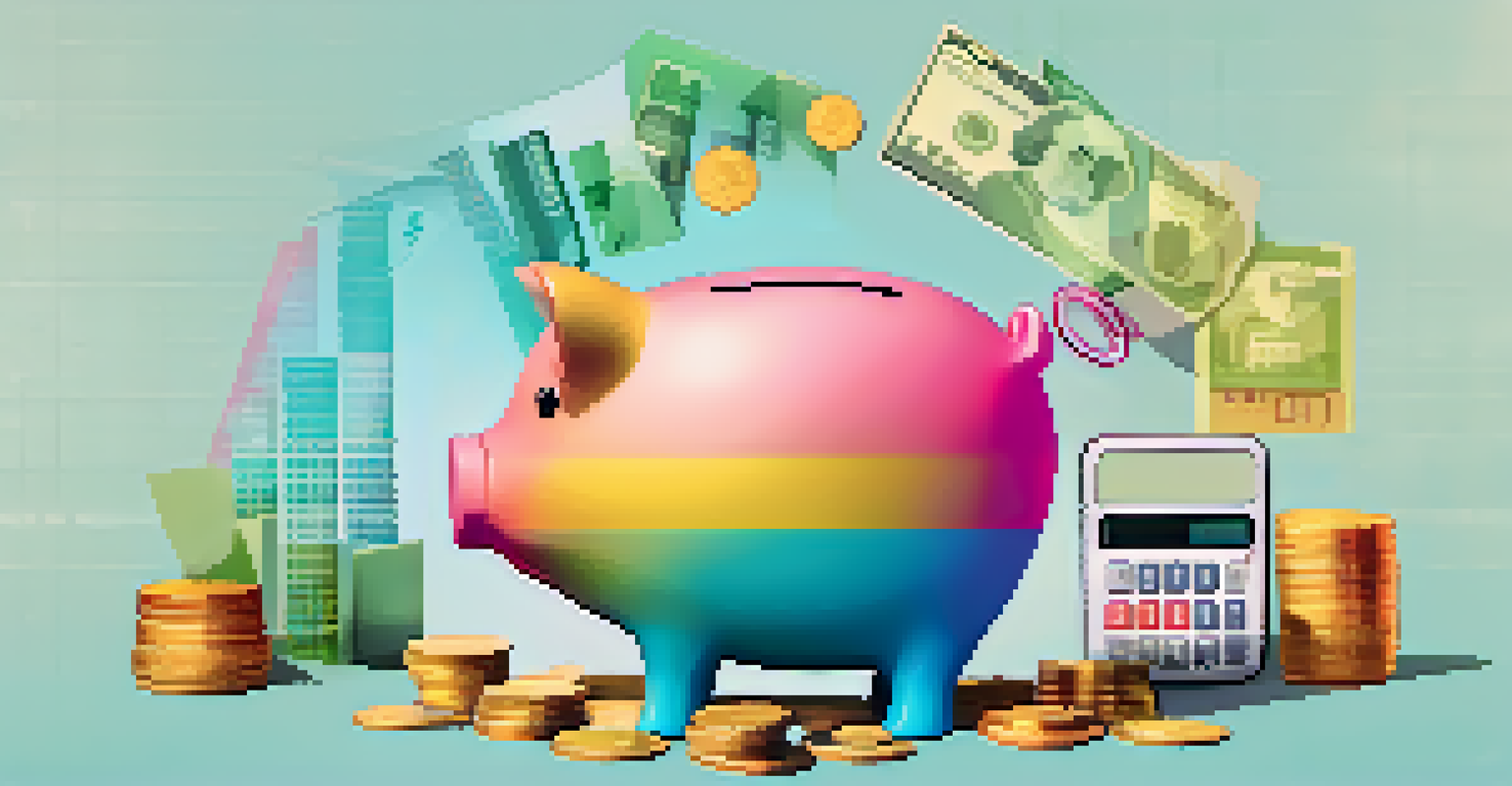The Impact of an Emergency Fund on Investment Decisions

Understanding What an Emergency Fund Is
An emergency fund is a financial safety net designed to cover unexpected expenses, such as medical emergencies or job loss. Typically, it's recommended to save three to six months' worth of living expenses in this fund. This reserve allows you to handle life's surprises without derailing your financial goals.
An investment in knowledge pays the best interest.
Having an emergency fund means you won’t have to rely on credit cards or loans during tough times. This can save you from incurring high-interest debt, which can impact your overall financial health. It's like a cushion that absorbs the shocks of life, providing peace of mind.
In essence, an emergency fund is your financial buffer, ensuring that you can face emergencies without panic. This foundational step is crucial for anyone looking to build wealth through investments.
The Relationship Between Safety and Investment Risk
Investing inherently involves risks; the higher the potential return, the greater the risk. However, when you have an emergency fund, you can take calculated risks with your investments. This safety net allows you to invest in higher-yield options without the constant worry of financial instability.

For example, if you know you have a few months of expenses saved up, you might feel more confident investing in stocks that are traditionally more volatile. Without that cushion, you might shy away from opportunities that could yield higher returns, fearing the need to liquidate investments in a pinch.
Emergency Funds Provide Financial Security
An emergency fund acts as a financial cushion, allowing you to manage unexpected expenses without resorting to high-interest debt.
Ultimately, an emergency fund provides the confidence to pursue a diverse portfolio, enhancing your potential for growth without compromising your financial security.
How an Emergency Fund Affects Financial Goals
An emergency fund can clarify your financial goals by giving you a clearer view of your financial landscape. With a safety net in place, you're less likely to make impulsive investment decisions driven by fear. Instead, you can approach investing with a long-term perspective, aligned with your overall goals.
It's not about how much money you make, but how much money you keep, and how hard it works for you.
For instance, if your goal is to save for retirement, having an emergency fund allows you to focus on consistent contributions to your retirement accounts. You won't be tempted to dip into those funds for unexpected expenses, preserving your long-term growth.
In this way, an emergency fund acts as a stabilizing force, keeping you grounded in your financial journey and allowing you to pursue your objectives without distraction.
Mitigating the Impact of Market Volatility
Market fluctuations are a natural part of investing, but they can be stressful without an emergency fund. When you have savings set aside, you're less likely to panic sell your investments during a downturn. Instead, you can ride out the volatility and make informed decisions based on your long-term strategy.
Imagine being in a situation where the market dips unexpectedly; with an emergency fund, you can weather the storm without feeling pressured to sell at a loss. This ability to stay the course can significantly enhance your investment outcomes over time.
Investing Confidence Through Stability
Having an emergency fund enables you to take calculated investment risks, promoting a diverse portfolio without compromising financial security.
Thus, an emergency fund is not just a financial buffer but also a psychological one, promoting a healthier investment mindset.
Creating a Balanced Financial Portfolio
An emergency fund allows you to strike a balance between saving and investing. You can allocate funds for short-term savings while also pursuing growth through investments. This balance is essential for a well-rounded financial portfolio, catering to both immediate needs and future aspirations.
For example, with an emergency fund established, you can confidently invest in assets like stocks or real estate, knowing that your short-term financial needs are covered. This diversification can lead to greater financial stability.
In this way, an emergency fund complements your investment strategy, ensuring that you have the flexibility to respond to various financial scenarios.
Reassessing Your Financial Strategy Periodically
Having an emergency fund allows you to periodically reassess your financial strategy. As your circumstances change, whether through a new job or a family milestone, you can adjust your investments accordingly. This proactive approach is crucial for maintaining alignment with your financial goals.
For instance, if your emergency fund grows larger than necessary, you might choose to redirect some of those savings into investments. This adaptability is key to optimizing your financial health over time.
Peace of Mind Enhances Investment Focus
With an emergency fund, you can reduce financial anxiety, leading to more thoughtful investment decisions and a long-term perspective.
Ultimately, the presence of an emergency fund encourages regular check-ins on your financial strategy, fostering a dynamic approach to wealth building.
The Peace of Mind That Comes with Preparedness
One of the most significant benefits of having an emergency fund is the peace of mind it provides. Knowing you have a financial backup can reduce anxiety and allow you to focus on your investments without constant worry. This mental clarity can lead to more thoughtful and effective investment decisions.
When you’re not stressed about unexpected expenses, you’re more likely to stick to your investment plan and resist the urge to make hasty decisions. Peace of mind fosters a long-term perspective, which is crucial in the world of investing.

In essence, an emergency fund is not just about money; it's about creating a stable environment where you can thrive financially, ultimately leading to better investment outcomes.